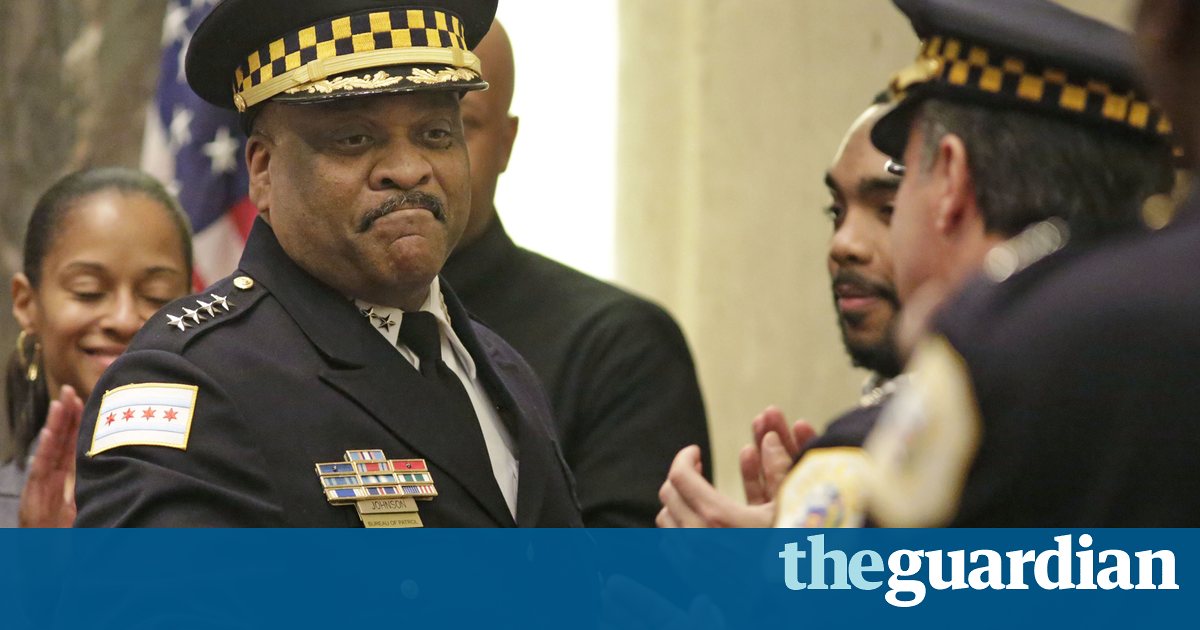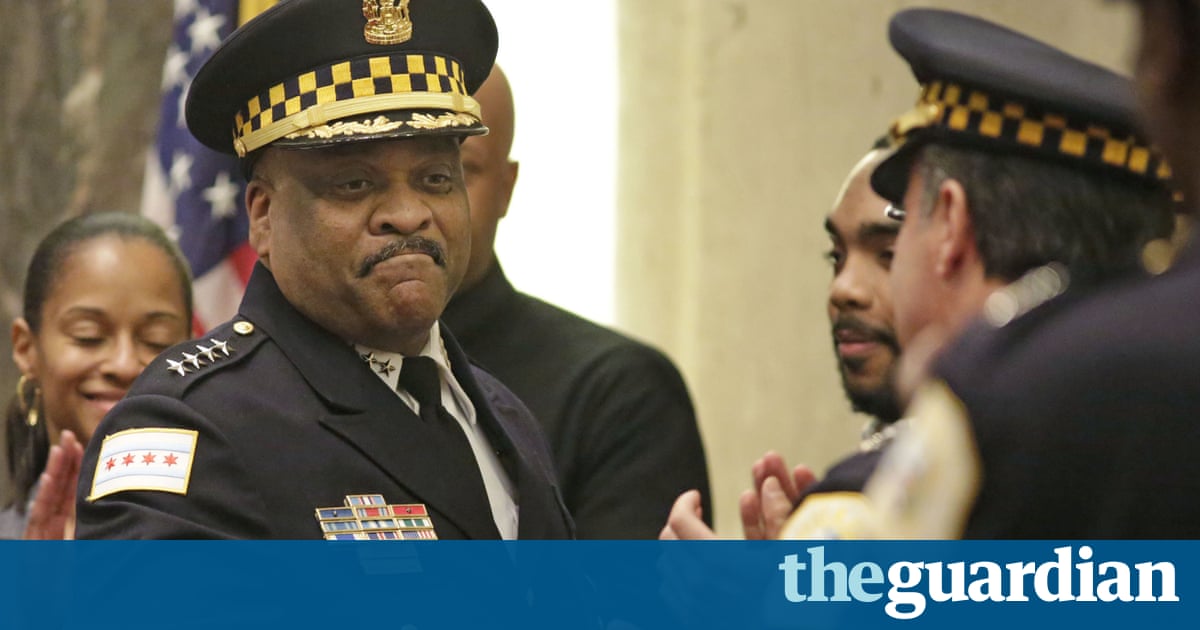Chicago police regularly engage in excessive force, says Loretta Lynch

US justice department finds black and Latino civilians hardest hit by unlawful force after 13-month investigation into citys law enforcement

The Chicago police department regularly uses force that is unjustified, disproportionate and otherwise excessive, federal investigators have concluded.
In a scathing report released after a 13-month process, Department of Justice (DoJ) investigators found that police violated both the fourth amendment of the constitution and department policy in the use of deadly force. Poor training and accountability systems contributed to the departments unconstitutional policing practices, the report said.
Our review of CPDs deadly force practices identified several trends in CPDs deadly force incidents, investigators wrote, including that CPD engages in dangerous and unnecessary foot pursuits and other unsound tactics that result in CPD shooting people, including those who are unarmed.
The US attorney general, Loretta Lynch, presented the report on Friday morning with federal and city officials, before announcing that the CPD and Chicago officials had agreed to begin negotiations to reach a court-enforceable reform agreement.
The lengthy report excoriated the CPD on a range of issues, but particularly faulted officer training and use of force, and the way that officers who use unreasonable force are held accountable. It also outlines systemic problems within the department regarding how officers are supervised and supported.
Black and Latino civilians are hardest hit by CPDs pattern of unlawful force, deputy assistant attorney general Vanita Gupta said on Friday.
In all incidents where police used force over a five-year period, black civilians were subject to force in 76% of cases. This disparity increased when force was used against children: 83% of cases involved black children and 14% involved Latino children, the report found.
Racial disparities were also present when civilians submitted misconduct complaints. A white complainant was three and a half times more likely to have his or her allegation sustained and an officer held accountable than a black complainant, according to the DoJ.
Officers who used unreasonable force were almost never held accountable, investigators wrote, adding that there is no meaningful, systemic accountability for officers who use force in violation of the law or CPD policy.
This lack of accountability allowed officers who should have been fired to remain on the force, and in some cases continue their misconduct, the DoJ concluded.
The report featured dozens of case studies and examples. Among the incidents included in the report:
- Foot pursuits: the DoJ said it found numerous incidents where officers shot at fleeing people who posed no immediate threat. Police reportedly stopped a man they saw walking down the street and fidgeting with his waistband. Officers pursued the man when he fled and fired 45 rounds toward him, the report said. Although the officers claimed the man had fired at them, no gun was found on his person, according to the DoJ. The police review process concluded the shooting was justified. An inoperable gun was found in the area of the shooting. Chicago police do not have a written policy on foot pursuits.
- Use of force against children: investigators said police had subjected children to force over non-criminal conduct or minor violations. An officer learned that some boys were playing basketball on his property and, while on duty, left his district to return home, the report said. He found the boys down the street, after which he pointed his gun at them, used profanity, and threatened to put their heads through a wall and to blow up their homes. The boys said they were handcuffed and forced to lie face-down. The officer involved received a five-day suspension and was never interviewed by police investigators.
- Racist language: young black civilians told the justice department they are routinely called nigger, animal, or pieces of shit by police officers, and officers themselves confirmed such statements to the DoJ.
- Guns for freedom: officers use dangerous and sometimes unlawful methods to elicit information from people they have arrested, the DoJ said. The report highlighted alleged practices such as guns for freedom, in which officers detain someone for a low-level, nonviolent offense, such as a traffic offense, and then demand the person exchange a gun to secure their release or guarantee they wont be stopped again.
The Chicago investigation is unprecedented in its scope. US attorney Zachary Fardon said last year that the investigation was the largest of its kind in the justice departments history. Investigators reportedly moved up the completion of the report so that it could be published before Donald Trump takes office next week.
Trump campaigned as a law and order candidate, calling for more support for police officers. Jeff Sessions, Trumps nominee to head the justice department, has similarly questioned intense scrutiny of law enforcement. In confirmation hearings on Tuesday, Sessions said department investigations tended to undermine respect for our police officers.
Both Lynch and Chicagos mayor, Rahm Emanuel, expressed confidence in each partys commitment to reform. Emanuel declined to speculate on Sessions willingness to participate and said he had not yet spoken with the Trump transition team about the DoJs findings.
I cant negotiate for him but were going to be at the table, he said.
Jonathan Smith, who spent five years with the DoJs civil rights division, said he expected nationwide attention to make a reform agreement likely, but speculated that the strength of such reforms would depend on community involvement.
If left to the city and to the Department of Justice, Im worried that youre not going to see the same kind of robust agreement that you saw in Baltimore yesterday, he said.
On Thursday, Lynch announced a reform agreement with police in Baltimore, following a similar investigation.
The Chicago investigation and other reforms were sparked by the release of shocking video footage that showed a CPD officer fatally shooting 17-year-old Laquan McDonald.
A judge ordered the city to release the footage in November 2015, more than a year after the black teen was killed. The video showed the teen walking down the middle of the road, a small knife hanging limply by his side, before a responding officer, Jason Van Dyke, shoots and kills him as he walks away.
A local prosecutor charged Van Dyke with murder hours before the footage was released. In the following days the police chief was fired and the investigation was launched amid protests in the city and calls for reform.
The release of the dashboard camera footage received instant national and international attention, similarly to other high-profile police killings of dozens of other unarmed black civilians over the past two years.
Investigations into police departments have taken place in Ferguson, Missouri, after the shooting death of Michael Brown and in Baltimore after Freddie Gray died in police custody.
The attorney general opens such so-called pattern or practice investigations after receiving credible allegations of systemic police misconduct and unconstitutional practices. The Obama justice department has opened 25 such inquiries.